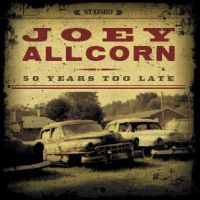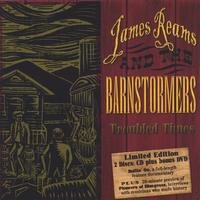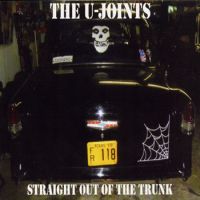 Label: Self-Released
Label: Self-Released Fiddle. Steel Guitar. The Yodel. These are all elements of country music that have long been forgotten. Artists who strive to be Lynyrd Skynyrd-lite rather than Ernest Tubb now dominate mainstream country radio, and fans of country’s golden years are led to believe that the genre’s heart and soul have been buried along with the previously mentioned country elements in favor of corny ballads and faux rodeo cowboy ditties. To these fans, rejoice, for a different kind of country scene is alive and well… one that celebrates the past, yet still sounds fresh in 2006. This scene features several artists, including Joey Allcorn. The young singer/songwriter from Columbus, GA’s debut album 50 Years Too Late is a perfect introduction to those fans interested in exploring this other side of country music. On his outstanding debut, Allcorn shines with a blend of the heartbreak and honky tonkin’ of old and a heavy modern grunge rock attitude.
For someone only 25 years old, 50 Years shows that Joey Allcorn has an extensive knowledge of what used to make country music so special. He has a strong, nasal vocal delivery complete with a yodel that would make even the Opry stars of old smile. His songs of broken hearts (like the fiddle-driven “So Say Goodbye”) do not sound plastic or fake, and his hard-living numbers (such as the rockin’ “Tired of Being Blue”) are raw without being ridiculous. He also delivers an excellent prison song that quickly has listeners singing along (“Alabama Chain Gang”), pays tribute to the legends in the album’s title track, and sends an angry message to Nashville and its pop country sound in “In Nashville, Tennessee.” 50 Years proves that Allcorn is no one-trick pony as a songwriter. Whatever kind story he decides to tell, he always does an incredible job.
Of course, what makes 50 Years particularly interesting is the wide range of sound it covers. The album begins with songs like “I Just Don’t Know” and the Lefty Frizzell-like “Here I Go Again” that have a straight, old school country sound. As the album progresses however, the style changes. Dark tales like “Son of a Ramblin Man” and more progressive numbers like the jazz-fused “Don’t You Call on Me” are featured. Finally, towards the album’s end are songs that could just as easily fit in on a hard rock album as a country album, like the outstanding country/grunge rock hybrid “Like I Never Will Again,” where both the heavy electric and steel guitar play powerful roles. Yet, even these heavier songs have a country heart that is beating strong. In a way, the album plays like a country music trip through time, which makes for a listen that is both interesting and highly entertaining.
50 Years Too Late is also given a major boost from Allcorn’s talented friends who appear on the record. The most famous of these friends, Hank Williams III, gives perhaps his most thought-provoking vocal performance ever on “This Ain’t Montgomery”: a song about avoiding Hank Williams Sr.’s shadow to create one’s own identity in a world far different than the one he dominated fifty years ago. Lonesome Wyatt of Those Poor Bastards, the writer of Hank III’s hit “Pills I Took,” also lends his creepy vocal chops on the dark, Jimmie Rodgers-esque “Graveyard Bound.” Several outstanding musicians are also featured, including the amazing Donnie Herron of BR549 and Bob Dylan’s current touring band on fiddle, Andy Gibson of Hank Williams III’s Damn Band’s steel guitar perfection, guitar master Johnny Hiland, and legendary country pianist Walter Cunningham. This all-star cast makes Allcorn’s already great songs even better, and 50 Years an even bigger pleasure for country fans.
Allcorn states in the album’s title track that, “it might turn out that it was fate that I was born fifty years too late.” 50 Years Too Late listeners will agree, for the record could have just as easily been titled “50 Years in the Making.” He would have been a star fifty years ago just like his idols, but after listening to his wonderful debut album, fans will be very happy that we have Joey Allcorn here with us in 2006, and if the good Lord’s willing, for a good fifty years more to come.






